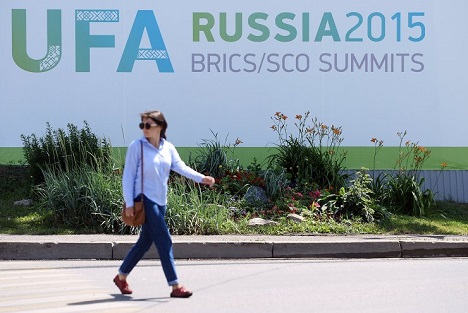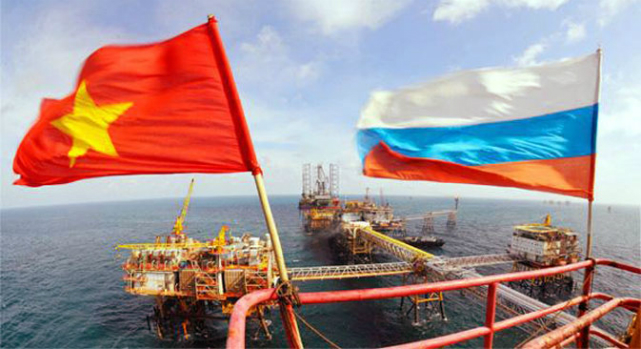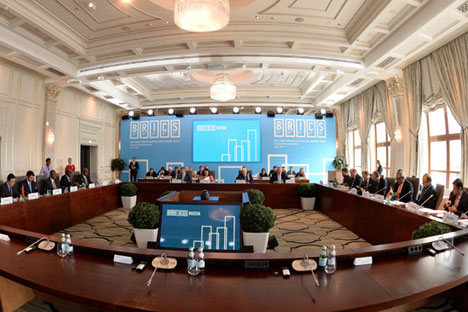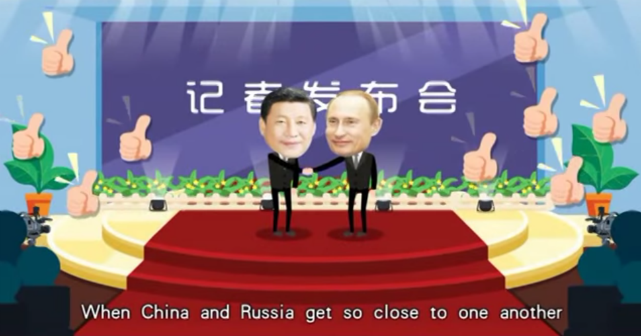What are the implications of India's and Pakistan's accession to the SCO?
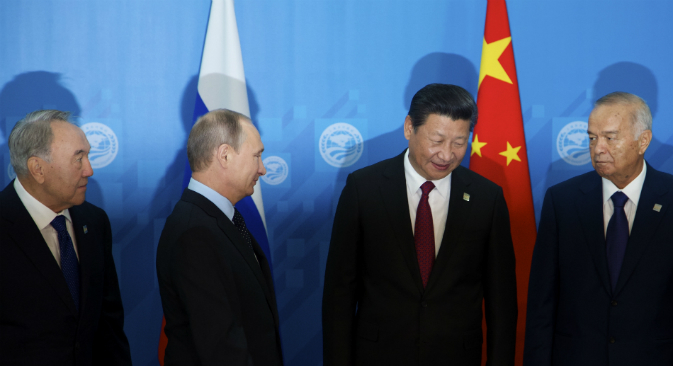
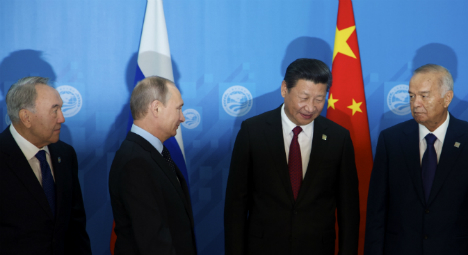
From the left: Kazakhstan’s President Nursultan Nazarbayev, Russian President Vladimir Putin, China’s Chinese President Xi Jinping, Uzbekistan's President Islam Karimov, prepare to pose for a photo during the SCO (Shanghai Cooperation Organization) summit in Ufa, Russia, Friday, July 10, 2015. Photo: AP
Last week the annual summit of the Russian-chaired Shanghai Cooperation Organization (SCO) concluded in Ufa. The summit launched the process of accession for India and Pakistan and adopted the Ufa Declaration on SCO Development to 2025.
Below, experts interviewed by Russia Direct explain the risks and opportunities facing Delhi and Islamabad and how their accession will affect the balance of power within the organization. In addition, these analysts analyze the development prospects of the new-look SCO.
Alexander Gabuev, head of the Russia in the Asia-Pacific Region program of the Carnegie Moscow Center
The SCO is changing quantitatively but not qualitatively. Its population, territory and share of global GDP are increasing, but the main problem is that this regional organization lacks a specific function to deliver something tangible.
The SCO continues its search for a mission. New countries are seeking to join not because of the great prospects, but for fear of falling behind the powers of continental Eurasia already inside. That is the main motivation for India and Pakistan to join the SCO.
Russia supported India’s entry into the SCO as a balancer against the weight of China, but it will have no effect on the long-term viability of the organization. China agreed to the accession of India and Pakistan precisely because the SCO is being transformed from a tool for achieving pragmatic goals — namely the expansion of economic and cultural influence in Central Asia with Russian approval — into a symbolic organization.
The membership of India and Pakistan in the SCO is not that important for China. It has its own projects now, primarily One Belt One Road. The country is following a pragmatic route by creating domestic institutions underpinned by own financial resources, which all countries are now lining up to tap, including Russia, which is blocking the economic track of the SCO.
The SCO is becoming an emblematic club of like-minded members who do nothing except talk about how much population, land and global GDP they control.
Alexander Knyazev, expert on Central Asia and the Middle East
The accession process launched in Ufa for India and Pakistan to join the SCO is not clear-cut. SCO membership does not delegate new responsibilities to these countries, and neither does it impart new functionality to the organization.
The SCO was originally created as a border security organization between China, Russia and the five Central Asian republics. But security is no longer the priority, and the emphasis has shifted to economic relations, which China dominates. Not even India will be able to challenge the Celestial Empire’s leadership.
I believe that Moscow supports Delhi’s activation in the region, including under the auspices of the SCO, as a counterweight to the growing influence of China. The ingrained territorial disputes between China and India could be rekindled under the SCO and spill over into fierce competition for Central Asia.
Similarly, the conflict between India and Pakistan could shift to the SCO platform. The antagonisms between the two countries have always had a Central Asian dimension. Islamabad is no less active than Delhi in Central Asia.
India’s interest in the region has military overtones, too. A major dispute erupted a few years back over the Ayni Air Force Base in Tajikistan, the reconstruction of which was financed by Indian loans. India clearly views Central Asia as a strategic clamp with which to exert pressure on Pakistan from the rear should the situation on the Indian-Pakistani border flare up.
Abdugani Mamadazimov, Chairman of the Association of Political Scientists of the Republic of Tajikistan
The Ufa Declaration traces a line of continuity from the provisions adopted at the 2014 SCO summit in Dushanbe, where it was decided to lift the moratorium on the accession of new members and the expansion of partner countries in dialogue with the SCO.
Dushanbe, which borders Pakistan, is not interested in exacerbating the Indian-Pakistani conflict under the SCO, and seeks to conduct a balanced policy in dealing with these two nuclear countries. Tajikistan sees SCO membership of India and Pakistan, and potentially Iran, as a possible means to solve the Afghan problem.
Cooperation under the SCO between these three major countries on Afghanistan’s borders could expedite the process of an Afghan settlement: Afghanistan will be surrounded by a powerful regional association with common values and approaches to resolving issues.
Sanat Kushkumbayev, deputy director of the Kazakhstan Institute for Strategic Studies under the President of the Republic of Kazakhstan
Kazakhstan’s participation in the SCO dovetails with the country’s multi-vector policy, allowing it to promote national interests and make adjustments to the agenda, for which reason Astana remains committed to the organization. But the results in Ufa should not be overvalued. The SCO summit was used more as a platform for political statements in the complex international environment that Russia finds itself.
The start of India and Pakistan’s accession to the SCO was top of the agenda, but de jure the process has yet to be fully clarified. It is quite possible that an existing SCO member could block their entry.
There is a risk that SCO expansion could overshadow the importance of Central Asia and other more urgent matters, and alter the initial structure and concept of the organization. Central Asia will find it harder to advance its own positions and cooperate on regional issues.
What are the major challenges for the SCO and for its new members? Read the full story at Russia Direct.
Russia Direct is an international analytical media outlet with the focus on foreign policy. Its premium services, such as monthly analytical memos and quarterly white papers, are free but available for subscribers only. For more information about the subscription, please visit russia-direct.org/subscribe.
All rights reserved by Rossiyskaya Gazeta.
Subscribe
to our newsletter!
Get the week's best stories straight to your inbox

